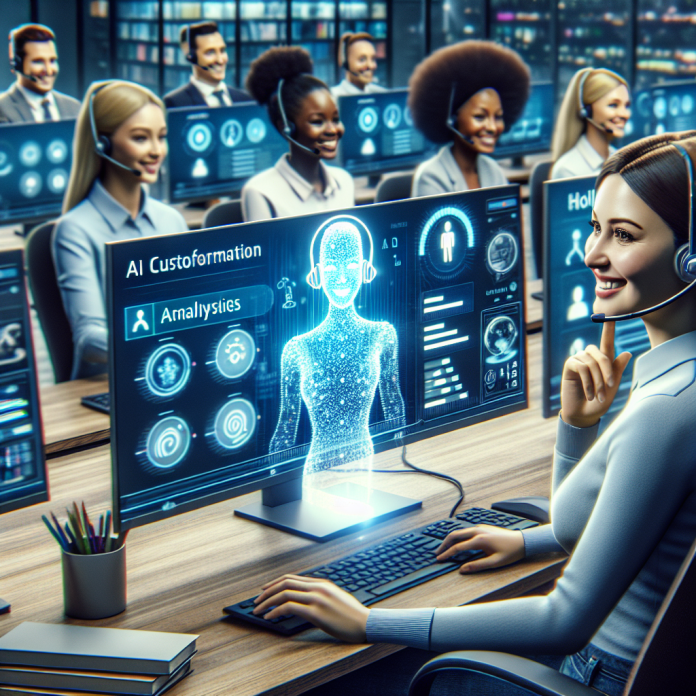Enhancing Customer Experiences with AI
In a world where customer expectations are constantly evolving, businesses are turning to artificial intelligence (AI) to deliver personalized, efficient, and engaging experiences for their customers. From chatbots and voice assistants to predictive analytics and recommendation engines, AI technologies are reshaping the way companies interact with their consumers.
## The Rise of AI in Customer Experience
AI has become a game-changer for businesses looking to revolutionize their customer experiences. By harnessing the power of machine learning, natural language processing, and other AI technologies, companies can provide personalized interactions and tailored recommendations, leading to increased customer satisfaction and loyalty.
One of the most common applications of AI in customer experience is through chatbots. These virtual assistants are designed to answer customer queries, provide product information, and even process transactions in a seamless and efficient manner. For example, when a customer visits a company’s website, a chatbot can engage with them in real-time, offering assistance and guidance throughout their browsing journey.
Voice assistants, like Amazon’s Alexa and Apple’s Siri, are another example of AI technology making waves in the customer experience space. These intelligent assistants can help customers with a wide range of tasks, from placing orders to checking the weather, all through natural language interactions. By integrating voice assistants into their services, businesses can provide a more convenient and intuitive experience for their customers.
## Personalization and Recommendations
One of the key benefits of AI in customer experience is its ability to deliver personalized recommendations based on customer preferences and behavior. By analyzing data such as past purchases, browsing history, and demographic information, AI algorithms can generate tailored product suggestions that are more likely to resonate with each individual customer.
For example, online retail giant Amazon uses AI-powered recommendation engines to suggest products to customers based on their browsing and purchasing history. By analyzing billions of data points, these algorithms can predict what items a customer might be interested in, leading to increased sales and customer engagement.
Similarly, streaming platforms like Netflix and Spotify use AI to create personalized playlists and recommendations for their users. By analyzing listening habits, genre preferences, and user ratings, these platforms can deliver a curated experience that caters to each individual’s tastes, making it more likely that customers will continue using their services.
## Predictive Analytics and Customer Insights
Another valuable application of AI in customer experience is the use of predictive analytics to anticipate customer needs and behavior. By analyzing historical data and trends, AI algorithms can forecast future customer interactions, allowing businesses to proactively address customer issues and provide targeted solutions.
For example, airlines use predictive analytics to forecast flight delays and cancellations, allowing them to rebook passengers and communicate updates in real-time. By leveraging AI technology, airlines can minimize disruptions for their customers and ensure a smooth travel experience, leading to increased customer satisfaction and loyalty.
Moreover, companies can use AI to gain valuable insights into customer behavior and preferences, allowing them to tailor their products and services to better meet customer needs. By analyzing data such as social media posts, online reviews, and customer feedback, businesses can identify trends and patterns that can inform their marketing strategies and product development efforts.
## The Future of AI in Customer Experience
As AI technology continues to evolve, the possibilities for enhancing customer experiences are endless. From virtual reality shopping experiences to personalized marketing campaigns, AI is poised to revolutionize the way businesses interact with their customers in the years to come.
In the era of digital transformation, companies that embrace AI in their customer experience strategies will have a distinct competitive advantage, gaining insights into customer preferences, automating routine tasks, and delivering personalized interactions that foster long-term relationships with their customers.
In conclusion, AI is reshaping the customer experience landscape, enabling businesses to provide personalized, efficient, and engaging interactions with their customers. From chatbots and voice assistants to personalized recommendations and predictive analytics, AI technologies are empowering companies to deliver superior customer experiences that drive loyalty and satisfaction.
As we look to the future, the role of AI in customer experience will only continue to grow, opening up new opportunities for businesses to innovate and differentiate themselves in an increasingly competitive marketplace. By harnessing the power of AI, companies can unlock the full potential of their customer relationships and drive sustainable growth for years to come.

